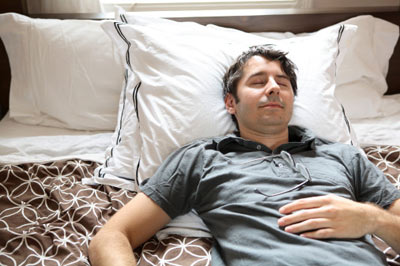Paroxysmal nocturnal dyspnea
Paroxysmal nocturnal dyspnea or paroxysmal nocturnal dyspnoea (PND) refers to attacks of severe shortness of breath and coughing that generally occur at night. It usually awakens the person from sleep, and may be quite frightening. Though simple orthopnea may be relieved by sitting upright at the side of the bed with legs dangling, in those with PND, coughing and wheezing often persist in this position.
PND is caused in part by the depression of the respiratory center during sleep, which may reduce arterial oxygen tension, particularly in patients with interstitial lung disease and reduced pulmonary compliance. Also, in the horizontal position there is redistribution of blood volume from the lower extremities and splanchnic beds to the lungs (orthopnea). In normal individuals this has little effect, but in patients in whom the additional volume cannot be pumped out by the left ventricle because of disease, there is a significant reduction in vital capacity and pulmonary compliance with resultant shortness of breath. Additionally, in patients with congestive heart failure the pulmonary circulation may already be overloaded because the failing left ventricle is suddenly unable to match the output of a more normally functioning right ventricle; causing pulmonary congestion. It is also important to note that left-sided heart failure can lead to right-sided heart failure. Pulmonary congestion decreases when the patient assumes a more erect position, and this is accompanied by an improvement in symptoms.
Nursing interventions for paroxysmal nocturnal dyspnea might include administering supplemental oxygen to help ease the symptoms of shortness of breath, and dietary recommendations. The most important dietary change that people suffering from congestive heart failure and paroxysmal nocturnal dyspnea need is to reduce their salt intake. Salt causes the body to retain fluid, and so minimizing your salt intake will help reduce the fluid that builds up in your lungs at night. The nurse might suggest that you not add salt to your food, and that you use herbs and spices rather than salt in your cooking. Processed food, canned or frozen food, and fast food, should all be nearly eliminated. Your nurse might also offer suggestions for altering the way you sleep; she might suggest you sleep propped up with several pillows to help alleviate lung congestion at night